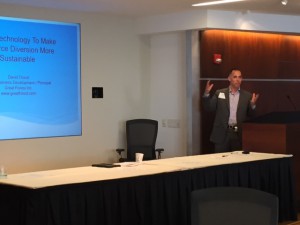
What are the latest sustainability trends and challenges facing buildings and businesses?
A recent panel on the topic organized by the Apartment and Office Building Association (AOBA) and the Downtown D.C. Business Improvement District (BID) drew about 60 people from across the industry, including representatives from local government and property management companies.
Keynote speaker Brendan Shane, C40 Cities’ regional director for North America, provided an update on cities taking action to reduce greenhouse gas emissions. In particular, he spoke about how Vancouver has recently put in place a sewer heat recovery system to supply a district energy system with great results. It is a system that D.C. is exploring.
David Troust, Great Forest’s V.P. of business development, highlighted current trends in recycling, including:
– The use of technology. He spoke about a current pilot in D.C. involving a potentially industry-changing product – a remote wireless sensor from Enevo that can make waste bins smarter. The sensors work in a similar way to a ship’s sonar, using ultrasound to “see” inside of your waste container to measure fill-levels. Data collected to date at buildings using the sensors in the pilot program has already proven very useful for metrics and right-sizing.
– The use of video for recycling education – David pointed out that while businesses have to start getting serious about resource diversion, may people still do not understand the basics of what they can recycle, and how recyclables need to be sorted and handled for proper processing. For example, many are not aware that keeping recyclables as clean as possible is key to receiving the highest value possible. The solution is education. And one of the best ways to get the message out is through video that can be easily shared among a building’s multiple tenants or a companies multiple properties.
– The final frontier of recycling. After basic recycling, composting is the only way to truly increase your diversion rate.
Other topics explored by the panel included:
– the WELL Building Standard: a new option for building owners and managers focusing on human health in buildings. Since a healthy and happy workforce means fewer few sick days, overall better productivity, and greater staff retention, this concept will become increasingly important. While the WELL standard can be costly, there are other ways to make buildings healthier for its occupiers outside the standard. It may take a while for the standard to catch on and for costs to come in line.
– an update on LEED v4: with its higher standards, LEED v4 will raise the bar with higher expectations on a number of items including ENERGY STAR performance. What would have qualified for LEED Gold now will only quality for LEED Silver once LEED v4 truly goes into effect. Buildings that want to certify under the current standard have until October 31, 2016 to register under LEED 2009 (a deadline, which was earlier extended from June 27, 2015). Note: the last day projects can submit for certification remains June 30, 2021.
